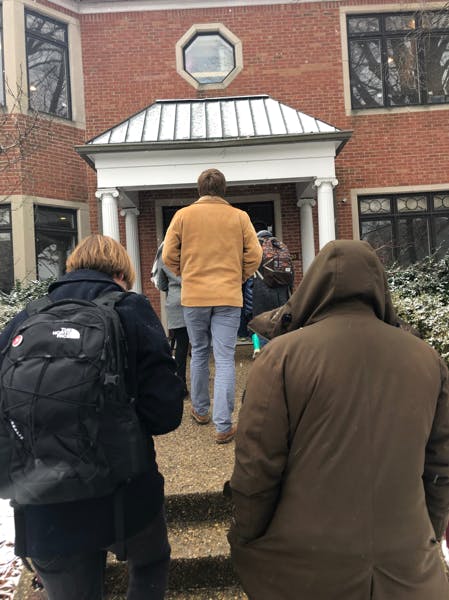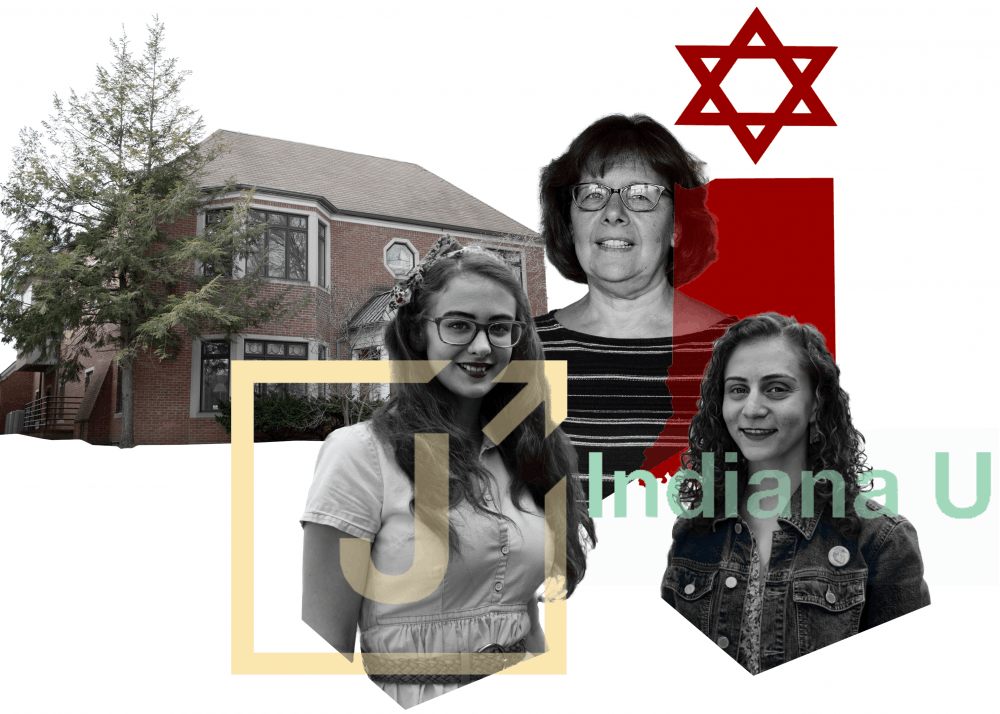About 25 students filed into a lounge around 5:30 p.m. Feb. 28 in the Helene G. Simon Hillel Center. A few days before, students had planned to show up to discuss Israel’s borders. Now they were there to protest.
In early February, IU junior Sarina Elenbogen-Siegel and sophomore Maya Harris began planning an event at Hillel meant to open up conversation on settlements and occupation in the West Bank. The West Bank is a territory tucked into Israel where some areas are controlled by the Palestinian Authority and others are controlled by Israel.
Elenbogen-Siegel and Harris are past co-chairs of J Street at IU, a campus affiliate of a national political organization, J Street, which advocates for a two-state solution to end the Israel-Palestine conflict.
In the weeks leading up to the event, miscommunication and political differences created tension between the students and Hillel leaders, according to text messages, emails and Facebook messages provided to the IDS. Around midnight the night before the event was to take place, it was postponed over text message by the executive director of Hillel.
The next day, when the event was planned to happen, students sat quietly on couches and on the floor. A few filmed while senior Leah Grynheim, also a former J Street co-chair, stood and spoke with two staff members from Hillel.
In the corner, Indiana Israel Public Affairs Committee President Jordana Ichilov stood and recorded on her phone in case the demonstration became aggressive. IIPAC is a student organization modeled after the American Israel Public Affairs Committee, a national pro-Israel lobbying group.
Grynheim read a statement on her phone from the organizers of the event detailing the problems the organizers faced while working with Hillel.
"We stand here as constituents of Hillel and/or members of the wider IU community,” Grynheim said. “Hillel, you have censored speech, censorshipped, that's a better word. And we are here today united — there's lots of us — to tell you what is wrong.”
Grynheim argued with the Israel Program director in the lounge for about 14 minutes.
Campus is working toward furthering the conversation on Israel. It is a discussion fueled by passion, faith and politics, but burdened by them as well. When an organization outside the campus gates has the ability to influence the flow of campus discussion, students question that power.

The United States is trying to figure out how to discuss its relationship to Israel. It doesn’t appear any easier for members of Congress than it is for college students.
In February and March, House Republicans and Democrats condemned Rep. Ilhan Omar for her comments about and criticism of Israel. Soon after, the House passed a resolution broadly condemning anti-Semitism. The resolution evolved to also denounce anti-Muslim discrimination and other bigotry against minority groups.
But not everyone agrees the substance of Omar’s comments — that the pro-Israel lobby has a tight control over discussion of Israel — were necessarily wrong, even if her word choice was inappropriate.
Anti-Semitism can be easy to condemn on the surface. Nazi symbolism and stereotypical representations of Jewish people are easily recognizable as anti-Semitic and wrong. But when it comes to Israel, the line between political criticism and anti-Semitism can be less easy to see.
Abdulkader Sinno, an IU associate professor who studies political science and conflict in the Middle East, said because Israel is a majority Jewish state, some believe criticizing Israel means criticizing all Jewish people.
“No, you can criticize Israel all day and all night,” Sinno said. “You are still criticizing a state and its leaders, not Jews in general.”
Criticism of Israel becomes anti-Semitism when someone criticizes Israel as being representative of what Jewish people are like, he said.
Sinno is the faculty advisor for the Middle Eastern Student Association and was present at the February demonstration. He said he was there to support the students involved because of the discrimination they faced.
Harris, one of the organizers of the event at Hillel, said she believes there is too much fear surrounding conversations about Israel. She said as soon as faults in Israel’s policies are mentioned, people are labeled anti-Semitic.
“The best form of patriotism is protest,” Harris said. “If you care about the policies and laws of a country, and you want it to get better — and we do want it to get better because this is something that we care about — then of course we're going to point out the parts where it's wrong. How can you not? How can you just say everything is fine and wave it off?"
At IU, many Jewish students' relationship to Israel and connections with other Jewish students is formed at least in part by Hillel, a private organization self-described as the “Jewish home on campus.”
There are around 4,000 Jewish undergraduate students at IU according to Hillel International’s website. IU is No. 9 on Hillel International’s list of the top 60 Jewish schools by population.
For many students, Hillel is also the only place near campus to attend religious services. While there are other synagogues in Bloomington, Hillel is the most accessible.
As Ichilov, president of IIPAC grew up and went to Jewish day school, she was taught when she went to college, Hillel was a place she could go to be Jewish.
“It’s like the synagogue on campus,” Ichilov said.
Historically, AIPAC, the national lobbying group IIPAC is modeled after, has dominated both the Republican and Democratic parties when it came to positions on Israel, Sinno said.
However, in the last 15 years or so, Sinno said, new voices in the Jewish community such as J Street have emerged. He said while both J Street and AIPAC are Jewish and support Israel, AIPAC is about making Israel dominant, and J Street is about creating an Israel that is peaceful with Palestine.
Now, Hillel has waded into the debate on how to discuss Israel.
During the February demonstration at Hillel, the leader of the protest read part of Hillel International’s Israel guidelines on political pluralism. It states Hillel works to create a space where students can discuss Israel in a civil manner.
Hillel serves many of the same purposes as IU’s culture centers, but it is a private organization.
In an interview, Rabbi Sue Silberberg, executive director of IU Hillel, said Hillel is not a political space. She said she respects Elenbogen-Siegel and Harris’ rights to discuss their beliefs on Israel.
“It's just sometimes they can't do it in the places they want to do it,” she said.
The night before the Israel Borders event was planned to happen, organizers of the event Elenbogen-Siegel and Harris sent an opinion editorial to the Indiana Daily Student.
In it, they claimed Hillel changed the event presentation without their permission, tried to involve other organizations in creating and giving the presentation and equated miscommunication between them as ignoring the group which, in their eyes, amounted to systemic silencing.
Silberberg said Hillel was not trying to silence them. She said they had agreed to do the program and would have been happy to reschedule it.
They didn’t change the PowerPoint, Silberberg said, but she also said Hillel’s Israel Program Director Becky Karkason was working with the students on the presentation.
However, the organizers of the event were not under the impression they would be working on the slides with Karkason and said she did not have their permission to edit the slides.
Both Elenbogen-Siegel and Harris spend hours each week practicing with Hooshir, IU Hillel’s Jewish a cappella group. They’ve also led Jewish services at Hillel. Now they say they feel cast out from the place meant to welcome all Jewish students.
“Our political deviation from the right-wing space that Hillel has created has continued to exclude us from discourse, civil or otherwise,” they wrote in the opinion editorial sent to the IDS. “This is not the first time we’ve been given obstacles by Hillel to access the Jewish community, our own community, but we will no longer remain silent.”
Screenshots of text messages, emails and Facebook messages provided to the IDS by Elenbogen-Siegel and Harris show a strained relationship between J Street and Hillel staff.
In 2017, emails between J Street and Silberberg show they were not allowed to pin fliers up in Hillel to advertise their organization.
Silberberg said J Street hasn’t been allowed to advertise and probably won't be allowed in the future because its mission is different than Hillel’s. She said she doesn’t want students to feel as if Hillel is putting a particular political agenda on them.
“Our mission about Israel is to really help students to appreciate and value the culture and the life of Israel and to just overall learn educationally about Israel,” Silberberg said. “I think their mission is a very clear political mission.”
However, the Indiana Israel Public Affairs Committee and AIPAC have been allowed to hang posters in Hillel.
Emails between members of J Street and Silberberg back in 2016 show both J Street and IIPAC were not allowed to have tables at Hillel’s Welcome Back BBQ at the beginning of the school year. However, IIPAC was allowed to have a table in 2018. Elenbogen-Siegel and Harris said J Street was still not allowed to participate.
Silberberg said IIPAC’s mission more closely aligns with Hillel because she said she believes its mission is to educate about Israel and lobby for Israel in terms of recognizing its right to exist, something fundamental to Jewish people's identity.
“I have not experienced where they have a particular political stance,” Silberberg said. “As far as I know, they're much more broad based.”
Sinno, the IU professor who studies political science, said there is a national divide between AIPAC and newer organizations such as J Street. He said these newer organizations represent a larger population of Jewish Americans.
“The dynamics filter down to other cities besides Washington, smaller towns like Bloomington,” Sinno said. “What we're seeing right now here on campus is a manifestation of that.”
The conflict between J Street and Hillel betrays the mission of Hillel, Sinno said. He said it bothers him personally because as a professor, he has a duty to make sure an organization outside of IU does not discriminate against students.
At the request of students, Sinno has brought up students' concerns about this issue with IU administrators, including Provost Lauren Robel. He said Robel responded to him, but he was not willing to share the contents of the emails on the record.
“Why do we exist if not for the students?” Sinno said.
Hillel has tried to do more to incorporate outside voices in conversations about Israel. In early February, Hillel co-sponsored an event that brought in a Palestinian to talk about the Israel-Palestine conflict.
He was the first Palestinian speaker Hillel has sponsored.
Some in the audience were happy to hear about the Israel-Palestine conflict from a Palestinian’s perspective. Others were disturbed by the speaker’s views.
His speech brought heated responses from the audience. One man said he wasn't critical enough of Israel. Another stormed out before hearing everything the speaker had to say.
Since the student-run event organized by Elenbogen-Siegel and Harris was postponed five weeks ago, neither the organizers nor staff at Hillel have reached out to find a new time for the discussion.
Elenbogen-Siegel said after what happened, she feels timid about reaching out to Hillel.
“I would like to, but in reality, I don't know if it's going to happen,” she said.



![Dean_Reingold_ltr[52] (1).jpg](https://snworksceo.imgix.net/ids/25483b05-dabd-4378-92bd-70a32c2579f0.sized-1000x1000.jpg?w=1500&ar=16%3A9&fit=crop&crop=faces&facepad=3&auto=format)
